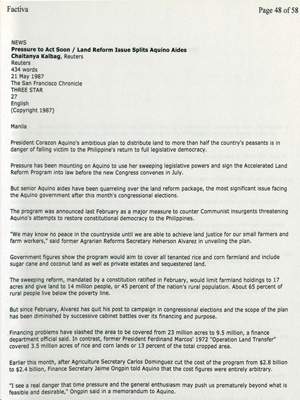Pressure to Act Soon / Land Reform Issue Splits Aquino Aides
[Reuters]
Published date: 21st May 1987
21 May 1987
The San Francisco Chronicle
THREE STAR
27
English
Copyright 1987
Manila
President Corazon Aquino’s ambitious plan to distribute land to more than half the country’s peasants is in danger of falling victim to the Philippine’s return to full legislative democracy.
Pressure has been mounting on Aquino to use her sweeping legislative powers and sign the Accelerated Land Reform Program into law before the new Congress convenes in July.
But senior Aquino aides have been quarreling over the land reform package, the most significant issue facing the Aquino government after this month’s congressional elections.
The program was announced last February as a major measure to counter Communist insurgents threatening Aquino‘s attempts to restore constitutional democracy to the Philippines.
“We may know no peace in the countryside until we are able to achieve land justice for our small farmers and farm workers,” said former Agrarian Reforms Secretary Heherson Alvarez in unveiling the plan.
Government figures show the program would aim to cover all tenanted rice and corn farmland and include sugar cane and coconut land as well as private estates and sequestered land.
The sweeping reform, mandated by a constitution ratified in February, would limit farmland holdings to 17 acres and give land to 14 million people, or 45 percent of the nation’s rural population. About 65 percent of rural people live below the poverty line.
But since February, Alvarez has quit his post to campaign in congressional elections and the scope of the plan has been diminished by successive cabinet battles over its financing and purpose.
Financing problems have slashed the area to be covered from 23 million acres to 9.5 million, a finance department official said. In contrast, former President Ferdinand Marcos’ 1972 “Operation Land Transfer” covered 3.5 million acres of rice and corn lands or 13 percent of the total cropped area.
Earlier this month, after Agriculture Secretary Carlos Dominguez cut the cost of the program from $2.8 billion to $2.4 billion, Finance Secretary Jaime Ongpin told Aquino that the cost figures were entirely arbitrary.
“I see a real danger that time pressure and the general enthusiasm may push us prematurely beyond what is feasible and desirable,” Ongpin said in a memorandum to Aquino.
Ongpin told Reuters that the cost had been further cut to about $2 billion and said land reform could only be a partial and temporary solution to rural poverty.
Many independent land reform advocates fear the program will have been so severely reduced it would have little effect on the plight of Filipino peasants.






